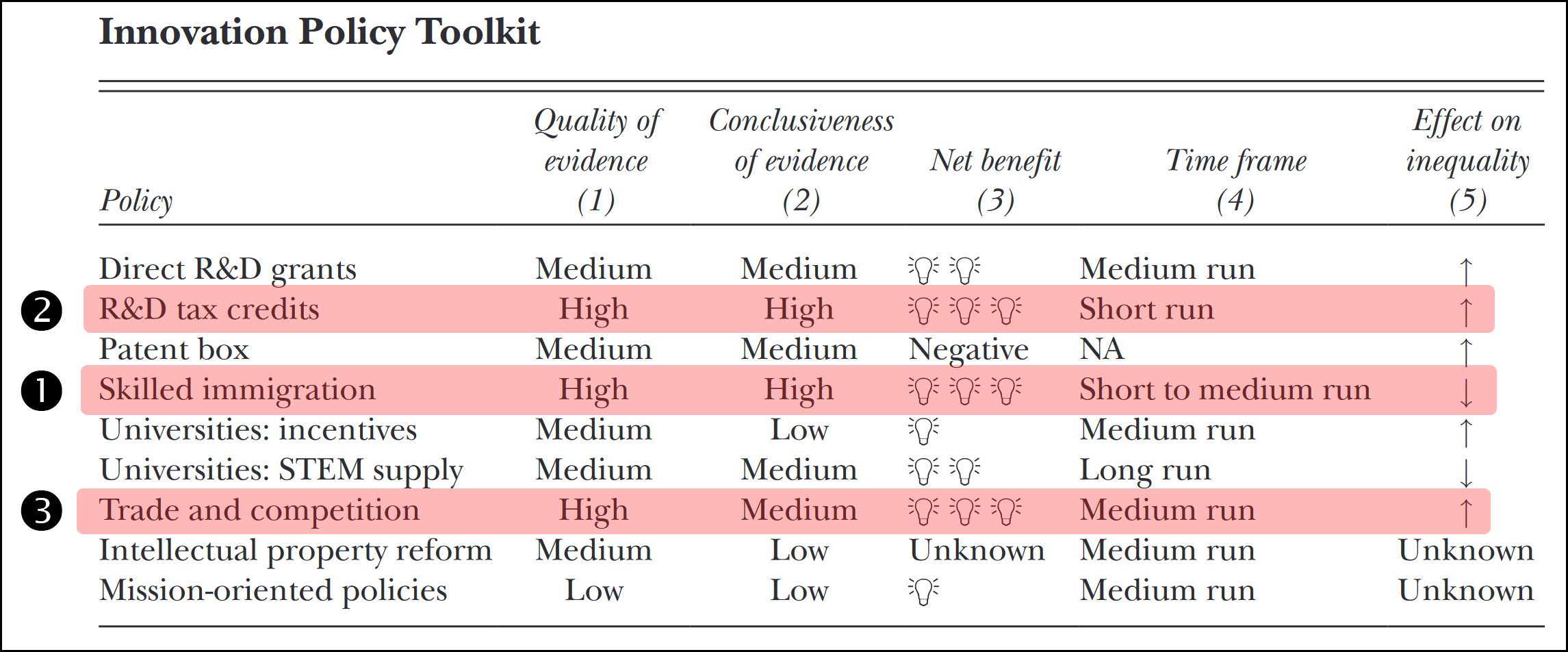This comes a little out of the blue, but this morning I happened to come across a paper on innovation policy that struck me as sensible and well-argued. It's an important thing to get right since innovation is the single most important key to both productivity growth—and thus rising living standards—as well as overall economic growth.
The authors look at a basket of potential growth policies and rank them by how well they're supported in the literature and how well they're likely to work. Here's the short list of alternatives, with the top three marked:
 Greater levels of skilled immigration ranks #1, with an added advantage that it reduces income inequality.
Greater levels of skilled immigration ranks #1, with an added advantage that it reduces income inequality.
R&D tax credits, a popular option, ranks #2.
Finally, increased trade and competition, which presumably includes greater antitrust enforcement, ranks #3.
None of this is terribly surprising, but sometimes it's useful to see even the obvious if you haven't seen it in a while.

How? It won't raise the skill levels of the extant population. The only way I can see it addressing income inequality is by driving down the wages of skilled workers.
Kevin's goal is increasing innovation. You're suggesting a different one. Perhaps we need a wealth tax, or some other measure to address inequality. That's orthogonal to Kevin's goal, but not necessarily incompatible.
Innovation should be rewarded.
“ with an added advantage that it reduces income inequality”
Various things influence productivity, but increasing productivity has not been trickling down to improve the living standards of most people in the US. Real wages have not increased since 1973. The CPI does not capture all increases in living standards, but the fact is that income inequality has greatly increased over the last 50 years. To improve overall living standards in the US, decreasing inequality may be more important than productivity.
The list of things that Kevin quotes is apparently designed as much to increase profits as productivity. A lot of them are things that industry wants. Productivity is increased by investment and automation, not by hiring people from other countries to work harder for less pay. "Greater levels of skilled immigration ranks #1, with an added advantage that it reduces income inequality." Oh sure, industry wants to import workers from other countries in order to pay them more than US workers and reduce its profits and the pay of executives.
If the US needs more skilled tech people, it should educate them here, not choke off funding for higher education and keep people in debt. How about increasing pay of educators, up through adjunct professors who do more and more of the teaching at the college level? Isn't it important to attract the best people to education?
Globalization has absolutely not increased either productivity or US GDP growth. It is remarkable how these undeniable facts are ignored by advocates of "free trade".
According to Peter Zeihen, globalization is coming to an end. Countries are going to have to produce more local consumption. I think skilled immigrants are needed, and there should be laws to ensure they are not underpaid because employers threaten to fire them and send them home. I think the amount of unskilled labor we are importing leads to more, not less inequality.
So it increases productivity to unleash the potential of highly skilled people, either by putting these people together with funding by subsidizing venture capital or by bringing more skilled people into the country. Increasing immigration of highly skilled workers is clearly a win.
Do we need to push a system that subsidizes venture capital, directly and by subsidizing the system where they get to own all these new innovative businesses? Can't the government just give unsecured loans to startups in exchange for equity? Venture capital has a pretty poor track record of picking winners.
What do you mean by equity?
Equity? A piece of the startup, same as venture gets today.
So no change, except that the government is providing the venture capital instead of the private monies?
In other words, the best way to get innovation in this country is to deprive other countries of their innovators.
Yup. Some countries are better at harnessing skilled labor than others, and the US is actually very, very good on that particular score. In fact, we're better at harnessing unskilled labor, too: the average Mexican immigrant in the US is four times more productive here than they were in Mexico, even if they haven't learned any new skills (per The Economist).
You can call it "depriving other countries of their innovators" if you want. I call it making the world more prosperous. Also, the question of how these productivity differences should inform US immigration policy is left as an exercise for the reader.
I can make $200 an hour working on my home computer. {h42 I never thought it was possible, but my closest friend made $25,000 in just five weeks working on this historic project. convinced me to take part. For more information,
Click on the link below... https://GetDreamJobs1.blogspot.com
772 pairs of twins (only half of them identical!) for thousands of traits. This is a massive statistical nightmare.
It means that many of the individual-trait results are incorrect by sheer statistics. It could explain the reading for pleasure vs. listening music conundrum. Or that "components of intelligence" seem less inheritable than "intelligence".
The fact that there are no confidence intervals in the graph only enforces my skepsis.
Pingback: Rishi Sunak führt mit Dorothee Keller einen Kulturkampf um patriotische Heizungen - Vermischtes 05.06.2023 - Deliberation Daily